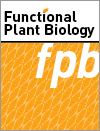
Functional Plant Biology
Volume 48 Number 5 2021
FP20168OsCER1 regulates humidity-sensitive genic male sterility through very-long-chain (VLC) alkane metabolism of tryphine in rice

OsCER1 contributes to C25 and C27 very-long-chain (VLC) alkanes biosynthesis in rice (Oryza sativa L.). Knockout lines of OsCER1 (OsCER1Cas) exhibited humidity-sensitive genic male sterility (HGMS) and defective tryphine. High humidity and maize (Zea mays L.) pollen could help to rescue the fertility of mutant, establishing the key role of tryphine in pollen germination under low humidity. This work revealed the mechanism of HGMS induced by VLC alkanes in rice and the generality of tryphine in different species of Gramineae.
FP20298Leaf gas exchange and bean quality fluctuations over the whole canopy vertical profile of Arabic coffee cultivated under elevated CO2
 , Eunice R. Batista, Ricardo A. A. Pazianotto, Maria B. S. Scholz, Guilherme A. R. Souza, Eliemar Campostrini and José C. Ramalho
, Eunice R. Batista, Ricardo A. A. Pazianotto, Maria B. S. Scholz, Guilherme A. R. Souza, Eliemar Campostrini and José C. Ramalho
In climate change scenarios, plants are exposed to drought, changing temperatures and elevated [CO2]. The raising levels of CO2 can partially mitigate the impact of drought and elevated temperature at the coffee leaf scale. Coffee plants integrate the individual leaf capacities to efficiently use light and water under climate stress.
It is not yet a common knowledge that plants transpire at night; however, many studies have demonstrated its substantial role in plants’ overall water loss. We demonstrate that different temperate tree species regulate little pores (stomata) that are responsible for transpiration, differently in favourable soil conditions, but very similarly in drought conditions. In the light of climate change, often related to more frequent and severe droughts, species benefitting from nocturnal transpiration might somewhat lose their advantage.
A shift from nitrogen (N)-limited to phosphorus (P)-limited growth induced by high N deposition by human activities may change plant growth in grassland in terms of physiology and morphology. Our results highlight that growth of Holcus lanatus L. is predominantly controlled by supply of mineral nutrient P and to a lesser extent by N, whereas net photosynthesis exerts no apparent control on growth under these nutrient-limited growth conditions. Our findings contribute to understanding of plant growth responses under nutrient-limited conditions.
FP20187Impact of elevated CO2 and heat stress on wheat pollen viability and grain production
 , Daniel K. Y. Tan, Rebecca J. Thistlethwaite, Richard Trethowan and Karolin Kunz
, Daniel K. Y. Tan, Rebecca J. Thistlethwaite, Richard Trethowan and Karolin Kunz
Changing climate poses a threat to Australian wheat (Triticum aestivum L.) production. Hence, there is a priority for breeding heat-tolerant wheat varieties. In this study, several heat-tolerant wheat genotypes were grown in simulated warmer climate and elevated CO2 and analysed for pollen viability, grain formation and yield. We established a protocol where pollen viability is an important trait for screening heat-tolerant wheat progenies for sustainable wheat yield at projected climate change conditions.
FP20280Monochromatic red light during plant growth decreases the size and improves the functionality of stomata in chrysanthemum
 , Tao Li and Ernst Woltering
, Tao Li and Ernst Woltering
In indoor horticulture, light quality can be precisely controlled. The chosen light quality regime affects both visual appearance and desiccation tolerance of ornamentals. By adjusting light regime during growth the quality of the ornamentals can be improved.
FP20242Drought resistance in Harumi tangor seedlings grafted onto different rootstocks
 , Lijuan Xi, Bo Xiong
, Lijuan Xi, Bo Xiong  , Xia Qiu, Shengjia Huang, Wenxin Xu, Jiaqi Wang, Bozhi Wang, Yuan Yao, Changwen Duan, Xiaoyu Tang, Guochao Sun, Xun Wang, Honghong Deng and Zhihui Wang
, Xia Qiu, Shengjia Huang, Wenxin Xu, Jiaqi Wang, Bozhi Wang, Yuan Yao, Changwen Duan, Xiaoyu Tang, Guochao Sun, Xun Wang, Honghong Deng and Zhihui Wang
We analysed the influence of drought stress on the resistance-related photosynthetic physiological indices of Harumi tangor plants grafted onto three different rootstocks. The results of this study reveal that Citrus junos rootstock exhibited the best drought resistance of the three rootstocks with greater antioxidant system and photosynthetic photosynthesis. Screening suitable rootstocks is essential for the development of late ripening citrus industry under drought stress.
FP20046Identification and characterisation of cold stress-related proteins in Oryza rufipogon at the seedling stage using label-free quantitative proteomic analysis

Low temperature is one of key abiotic stresses affecting global rice production. In this study, the label-free quantitative proteomics responding to cold stress were investigated in Dongxiang wild rice (Oryza rufipogon Griff.) and cold sensitive cultivated rice ‘Xieqing zao B’ (Oryza sativa L. ssp. indica cv.). Identification and characterisation of cold stress-related proteins. We identified the cold stress-related proteins of wild rice and described the cold stress response mechanism.




